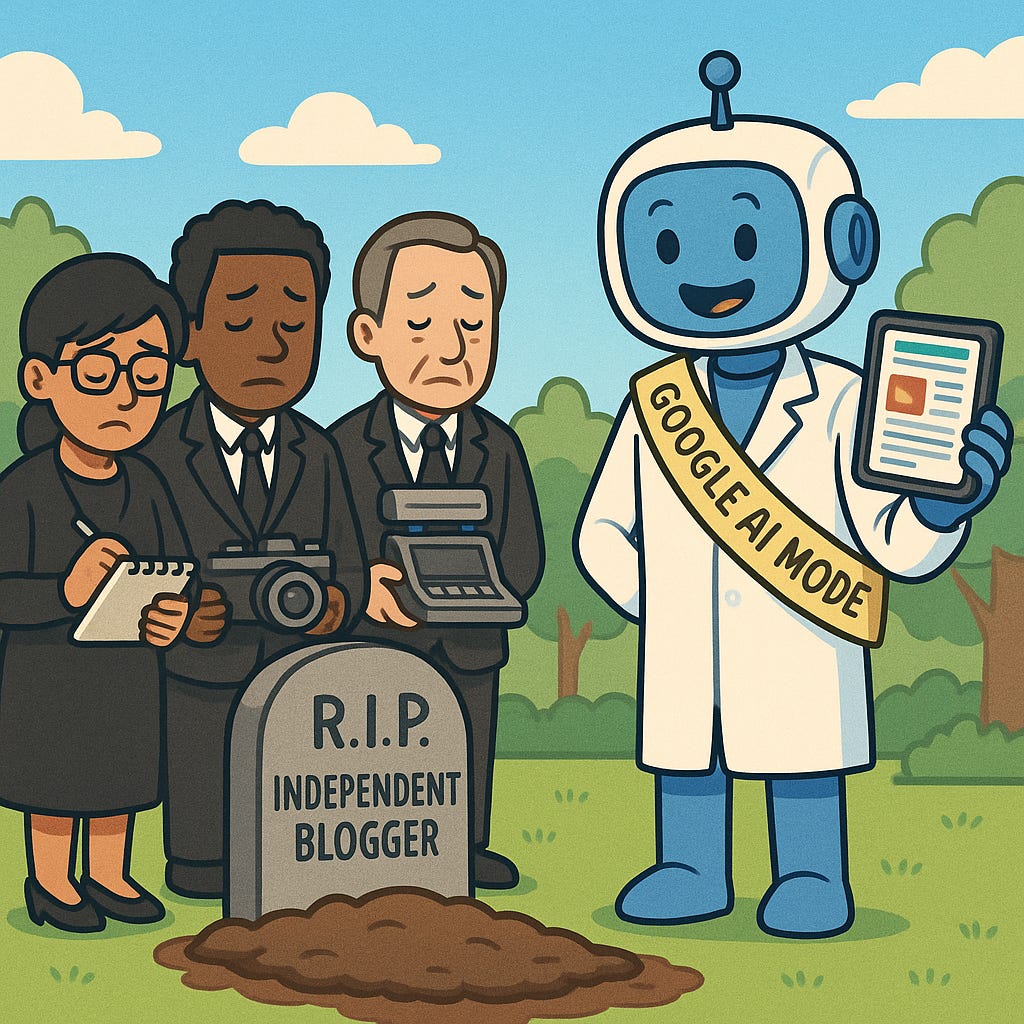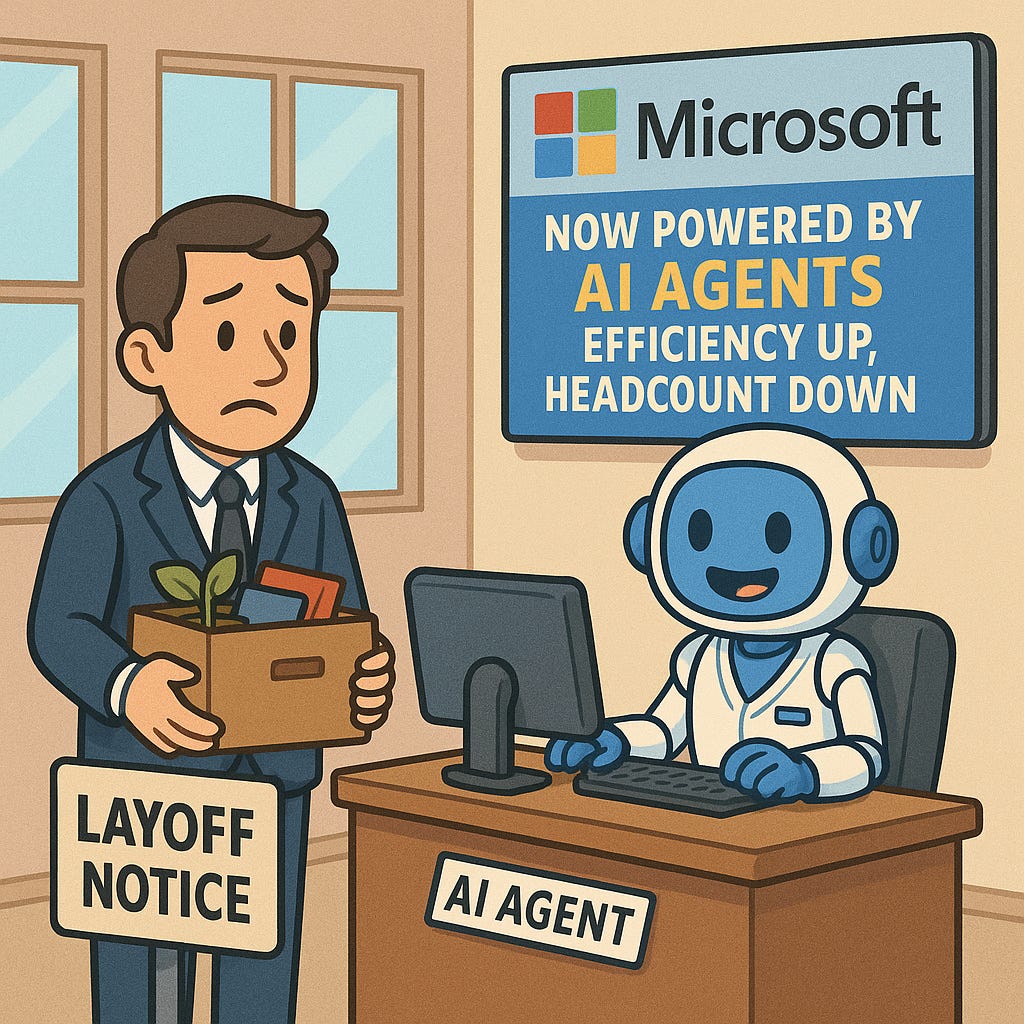- SumoGrowth AI Insights Newsletter
- Posts
- Google’s AI Mode Beta: The Final Blow to Blog Publishers
Google’s AI Mode Beta: The Final Blow to Blog Publishers
PLUS: Microsoft Aims for Collaborative AI Agents with Memory Capabilities
Top AI News, Trending AI Tools, and Business Automation Tips
Sponsored by Extendly - Launch your own AI Agency within 12 days 👀
Google’s AI Mode Beta: The Final Blow to Blog Publishers

Google’s latest experiment, AI Mode, currently in beta testing through Google Search Labs, is raising alarms among blog publishers who fear it could deliver a devastating blow to their traffic and revenue. This new feature, powered by a custom version of Google’s Gemini 2.0 model, replaces traditional search results with a comprehensive, AI-generated summary page, fundamentally altering how users access information and threatening the viability of independent blogs.
AI Mode, accessible to Google One AI Premium subscribers and a select group of U.S. testers, offers a conversational, chat-like search experience. Unlike Google’s AI Overviews, which provide concise summaries atop traditional links, AI Mode eliminates the classic “10 blue links” entirely, presenting users with a single, synthesized response that includes citations to web sources. While Google claims these citations drive traffic, early data and publisher feedback paint a grim picture. According to SEO expert Laurence O’Toole of Authoritas, AI-driven features like Overviews already reduce click-through rates by 40-52% on desktop, and AI Mode’s full-page summaries could exacerbate this “zero-click” trend, where users find answers without visiting source websites.
For blog publishers, who rely heavily on organic search traffic for ad revenue and affiliate marketing, this shift is existential. Carly Steven, SEO director at Mail Online, reported a staggering 56% drop in click-throughs for keywords where AI Overviews appeared, and warned that AI Mode’s broader adoption could be even more damaging. A small publisher consulted by AI expert Josh Jaffe saw a 50% traffic decline since AI Overviews launched, and fears AI Mode could “annihilate” what remains. Posts on X echo this despair, with one user lamenting, “There is zero point in starting an indie niche pop culture site now unless you really like talking about this stuff.”
Google argues that AI Mode enhances user experience by answering complex queries faster and cites higher click-through rates for links in AI Overviews compared to traditional results. However, publishers remain skeptical, as Google provides no granular data on AI-driven traffic, leaving them blind to the true impact. David Buttle, a media consultant, accuses Google of leveraging its search dominance to prioritize AI responses over publisher content, potentially forcing blogs into obscurity.
To survive, publishers are urged to pivot to branded searches (e.g., “Meghan Markle Daily Mail”) and create unique, high-value content like live blogs or opinion pieces that AI cannot easily replicate. Yet, with AI Mode’s beta signaling a future where search becomes an “answer engine,” many fear the open web’s ecosystem is at risk. As one X user put it, “The AI summary at the top of a Google search result is negatively affecting the content creators these summaries are derived from.”
Google plans to expand AI Mode based on beta feedback, with no confirmed global rollout date. For now, blog publishers face an uncertain future, scrambling to adapt as Google’s AI vision threatens to redefine the internet’s information highway.
Use Extendly to launch a new AI agency with a 12 day bootcamp. Includes webinars, group onboarding calls, implementation sessions, and more. Click HERE to learn more!
Microsoft Aims for Collaborative AI Agents with Memory Capabilities

Microsoft announced ambitions to develop AI "agents" that can collaborate and retain contextual memory, according to a Reuters report. These agents, designed to handle tasks like data analysis or customer service, would work together seamlessly, sharing information to improve efficiency. Unlike current AI models that often reset after each task, Microsoft’s agents would remember prior interactions, enabling more complex, human-like workflows.
CEO Satya Nadella emphasized this vision at a developer conference, highlighting potential applications in workplaces. However, challenges remain, including ensuring data privacy and managing computational costs. Microsoft is leveraging its Azure cloud platform to scale this technology, aiming to stay competitive in the AI race.
Get an AI team to handle inbound and outbound calls for your business using SumoGrowth. Never lose out on a lead again and boost booked appointments by 30%!
Click HERE to book a call today!
Other Top AI News Today
Apple's AI Challenges Threaten Market Position: Apple is facing significant hurdles with its Apple Intelligence and Siri AI, with insiders reporting ongoing development struggles. These issues could jeopardize iPhone dominance and future ventures like robotics, despite efforts to bolster AI since hiring John Giannandrea from Google in 2018.
AI Models Struggle with Timekeeping: A study at the 2025 International Conference on Learning Representations revealed that AI models struggle to read clocks and perform calendar arithmetic due to weaknesses in visual/spatial processing and insufficient training data, exposing limitations in AI reasoning compared to humans.
Microsoft Layoffs Reflect AI-Driven Efficiency: Microsoft laid off around 6,000 workers, with software engineering roles hit hardest, as the company leverages AI to cut costs. This move highlights a broader trend of AI reshaping workforce dynamics, particularly in tech-heavy regions like Washington state.
Iran Showcases AI Achievements: An AI exhibition was unveiled in Tehran during the 2nd Ministerial Meeting of the OIC-15 Dialogue Platform, featuring advancements in robotics, electric vehicles, and medical AI from major Iranian universities, signaling growing regional investment in AI innovation.
Meta’s AI Strategy Faces Delays: Meta has delayed the release of its advanced AI model, internally called “Behemoth,” raising concerns among employees about the company’s massive AI investments and its ability to keep pace with competitors in the AI race.
Watch AI voice demo calls to learn how to sell AI phone solutions to business owners. Get access to prompts, AI tools list, AI playbook, and more.
Click HERE to watch today!
Trending AI Tools Today
Fluig AI instantly turns any document or idea into mind maps, flowcharts, cards and tables. Brainstorm faster, organize info visually, and spark clearer, more creative thinking.
VisionStory writes slide‑by‑slide scripts and delivers them through a lifelike digital presenter. Pick from built‑in avatars or upload yours. No editing, just instant, affordable, dynamic video.
Codex by ChatGPT handles tasks like writing features, fixing bugs, answering code questions, and proposing pull requests—each in a separate sandboxed environment preloaded with your repo.
FinSEO helps you monitor your visibility across AI engines like ChatGPT, Perplexity, DeepSeek, Claude & Gemini. See daily mentions of your brand, domain, and compare with competitors. Every prompt is tracked—stay ahead in the age of generative search.
Creatify turns any product image into studio-quality marketing videos — from dynamic UGC-style showcases to cinematic product shots — helping brands create stunning content faster, cheaper, and at scale.
Run cold email campaigns using Instantly and get more booked meetings for your business. Includes AI email warmups and verified B2B leads database.
Click HERE to get a FREE trial today!
Business Tip of the Day
Leverage AI Agents to Boost Google Rankings Faster
In the rapidly evolving digital landscape of 2025, businesses must adapt to Google’s AI-driven search ecosystem to stay competitive. With Google’s AI Mode beta reshaping how search results are delivered, a powerful new strategy has emerged: using AI agents to optimize content and climb Google’s rankings. Here’s how businesses can harness AI agents to enhance their SEO game and drive traffic.
AI agents—autonomous, task-specific programs powered by models like Microsoft’s collaborative agents or Google’s Gemini—can revolutionize content creation and optimization. Unlike traditional SEO tools, AI agents can analyze vast datasets, predict trends, and execute strategies in real-time. For example, they can identify high-value keywords with low competition by cross-referencing Google’s search trends and competitor performance, ensuring your content targets the right audience. A recent study from SEO platform Ahrefs showed that pages optimized with AI-driven keyword strategies saw a 35% increase in organic traffic within three months.
To rank higher, businesses should deploy AI agents to craft content that aligns with Google’s AI Mode, which prioritizes comprehensive, user-focused answers. These agents can generate detailed, structured articles that address user intent, incorporating natural language patterns that resonate with Google’s algorithms. They can also optimize for featured snippets and AI-generated summaries by embedding clear, concise answers to common queries within content. For instance, an AI agent could analyze top-ranking pages for “best CRM software” and produce a blog post with a scannable comparison table, increasing the likelihood of appearing in Google’s AI-driven results.
Beyond content, AI agents excel at technical SEO. They can audit websites for issues like broken links or slow load times, which Google penalizes, and suggest fixes instantly. Tools like Microsoft’s Azure-based AI agents can even automate schema markup to enhance how content appears in search results. A case study from Moz highlighted a small e-commerce site that used AI-driven technical optimization to improve its page speed by 20%, resulting in a 15% ranking boost.
However, businesses must tread carefully. Over-reliance on AI-generated content without human oversight risks producing generic or low-quality material that Google’s algorithms may flag. Ensure AI agents are guided by human editors to maintain authenticity and brand voice. Additionally, prioritize unique content—like original research or expert opinions—that AI Mode can’t easily replicate, as advised by SEO expert Carly Steven.
To get started, invest in platforms like Jasper or Microsoft’s AI agent suites, which offer customizable workflows for SEO tasks. Set clear goals, such as targeting 10 high-intent keywords or reducing site errors by 50%, and let AI agents handle the heavy lifting. Monitor performance with tools like Google Analytics to refine strategies.
In 2025, AI agents are not just tools—they’re strategic partners in conquering Google’s AI-driven search landscape. By leveraging their analytical and creative capabilities, businesses can secure higher rankings, drive traffic, and stay ahead of the competition. Start small, iterate fast, and watch your SEO soar.
Want to grow your Linkedin network to get more clients? Use HeyReach for automated Linkedin outreach campaigns. Click HERE for a FREE trial today!
Podcast:
Want to listen to our newsletter on the go? Click HERE
Want to advertise to our newsletter? Contact us at [email protected]
Cheers,
Darius @ SumoGrowth